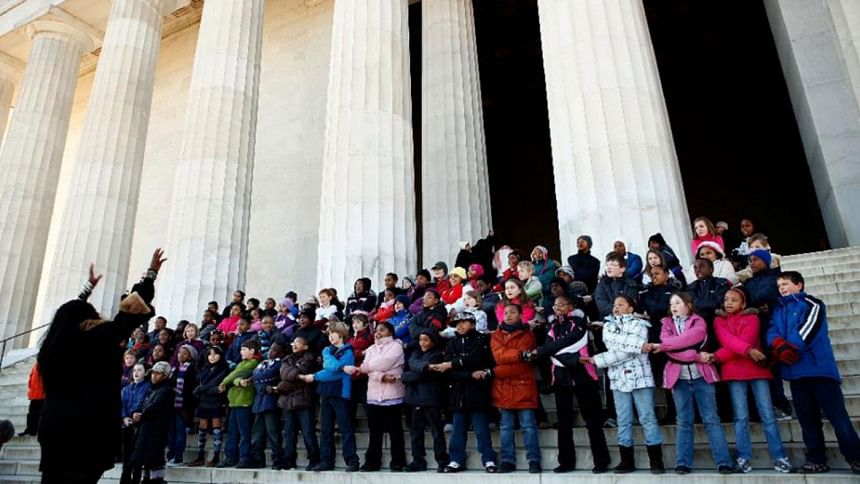'We Shall Overcome' folklorist Guy Carawan dies

Guy Carawan, a scholarly folk singer who helped turn "We Shall Overcome" into the anthem for the US Civil Rights Movement, has died. He was 87.
The Highlander Research and Education Center, a hub for activism in the South with which Carawan was affiliated for decades, said he died on May 2 near the institute's base in eastern Tennessee after several years of declining health.
Born in southern California to white Southern parents, Carawan initially was drawn to folk music as an academic and headed to Highlander to explore the genre.
Carawan quickly saw the power of folk music to galvanise the Civil Rights movement, later saying, "I don't want to be just an entertainer."
"We Shall Overcome" has long roots in the African American community with an early version -- "I'll Be Alright Someday" -- sung as a spiritual by slaves.
The song was turned more formally into a hymn at the start of the early 20th century by Charles Tindley, a minister who helped create modern Gospel music.
The song enjoyed a rebirth among striking tobacco workers in South Carolina in the 1940s and found its way to folk legend Pete Seeger, who standardized the title as "We Shall Overcome" -- words that would soon be heard across the United States.
But it was Carawan who turned the song into a social force. He taught the song to activists at the 1960 meeting that founded the Student Nonviolent Coordinating Committee, which became instrumental in leading sit-ins and other peaceful protests against the Jim Crow laws of racial segregation.
Carawan was open to adapting the music. After playing the song on guitar, he found that young singers in the Civil Rights Movement preferred to perform a cappella.
"They said, 'Lay that guitar down, boy. We can do the song better,'" he later told National Public Radio.
Writing the liner notes for a CD of Civil Rights Movement music, Carawan and his wife Candace -- his longtime collaborator -- said that the power of such collective vocal music lay in African American church tradition.
"The churches were the meeting places for the movement and singing was a central ingredient of mass meetings that took place night after night," they wrote.
The song became so identified with protesters that president Lyndon B Johnson invoked the line in his historic 1965 speech to Congress in which he threw his support behind the Civil Rights Movement.
"And we shall overcome," Johnson said, with an emphasis on the word "shall," a week after police in Selma, Alabama, violently repressed marchers.
The successful political use of the song came despite some initial skepticism.
One of Guy Carawan's professors in California had warned him that traditional songs could easily be exploited by right-wing movements, pointing to Nazi Germany's use of folk music, Candace Carawan later recalled in an interview for a Library of Congress history project.
The teacher said "you can hang out with people like Pete Seeger if you want to... but what you really need to do is just let a folk song be a folk song," she said.
Following the Civil Rights Movement, Guy and Candace Carawan turned their efforts to supporting impoverished people in Appalachia and later to the rights of immigrants and gays and lesbians.
Candace Carawan survives him, as do two children, according to the Highlander center.

 For all latest news, follow The Daily Star's Google News channel.
For all latest news, follow The Daily Star's Google News channel. 



Comments